Watching Shigatsu wa Kimi no Uso (Your Lie in April) has been an interesting experience that’s brought on a lot of complicated feelings of a personal nature. This has been happening to me a lot over the past month or two, often while watching different series or films that were never meant to be half as serious as this, but I feel like this series may have been the catalyst for that. This is stuff that I don’t know how to talk about publicly without embarrassing myself or just getting hopelessly off track so I don’t know if I’ll get too deep into it here or not. This probably won’t be the last time I write about this series so maybe I’ll finish some of these thoughts at a later date.
I kinda think this is the best drama I’ve ever watched, but I’m wary about resorting to superlatives. Looking over every anime title I’ve ever watched, I realize that despite my alleged affection for slow-paced or “thoughtful” series, I really haven’t watched very much at all that could be classified as drama (anime films are a different matter). This is a very unexpected realization to come to because I always thought that I had a real appreciation for this kind of storytelling. Apparently I don’t, so take my opinions with a grain of salt, if you choose.
Your Lie in April (I’ll be sticking to the English title from now on) was a series I started on a whim, and while the first episode teased an interesting premise that could lead somewhere interesting, so much of it was loaded with the kind of red flags that tell me not to expect too much. The animation, or at least the backgrounds (to say nothing of the great character design), were really beautiful. Too beautiful, perhaps. Midway through the episode I began to wonder how characters could even see where they were walking with the steady rain of cherry blossoms perpetually raining down on them. One of our main characters is introduced not only with said downpour of cherry blossoms, but a flock of majestic pigeons encircling her from above like a halo. Without introducing any kind of significant plot or establishing any kind of unique identity for itself at this point, it’s tempting to fawn over how pretty it all is while wondering if this might be another case of style over substance. But there’s a lot more to it than the gorgeous visuals and the vaguely Shinkai-inspired melodrama that you’d expect from them. There’s plenty of lighthearted moments as well as the kind of comically-violent overreactions unique to anime that are funny in small doses (and work much better on the printed page than on the screen, imho) but have never done much for me as any kind of steady running gag. This isn’t really important but I’ll be coming back to it later for reasons you probably won’t expect.
The setup: Kousei is a young piano prodigy who’s taking a permanent break of sorts from performing. It’s not that he’s actually quit, but rather has lost the only reason he ever knew for performing in the first place. Though a series of flashbacks, mostly flushed out after the first episode, we watch Kousei as his mother pushes him through grueling practices and an endless series of recitals that gradually rob him of a normal childhood. His childhood friend Tsubaki and best bud Watari have stuck by his side for years and give Kousei a reason to smile (or at least pretend to), but left to himself it’s clear that Kousei is suffering from a deep sadness that’s consumed his whole life. There’s a few major plot points that other bloggers will explain in detail but which I’d rather leave unmentioned. They’re hardly spoilers, but I think that episode synopses often do a disservice for potential viewers who deserve to experience the story on their own.
Episodes 1-11 are chiefly concerned with getting to the bottom Kousei’s gloom and resolving his inner conflicts. And when we meet Kaori, a brilliant young violinist who takes an interest in Kousei, it’s probably obvious that she’s going to play a big role in getting his life back on track. This kind of character has gotten a bad rap over the past few years but I think it’s important to let the story run its course before writing her off as a simple plot device to help induce change in the central protagonist. And it’s not as if she doesn’t have a lot of interesting character traits on her own; her love of music as a form of personal expression stands in stark contrast to the mechanical and impersonal style mercilessly drilled into Kousei over the years. These episodes do not explore her life in detail, but give us a few startling glimpses into it that hint at a potential focal point for the second half of the series. That’s all speculation, of course, and I’d rather focus on what’s here instead of trying to predict where the story is going (like most fans on Twitter seem obsessed with doing).
One aspect of the series that I need to mention here but don’t know where else to work in to this post: the characters’ musical performances, which feature prominently in several episodes and play a big part in the story, do not disappoint. Aside from sounding fantastic and getting me really engaged in a type of music that I don’t listen to very often, the performances are animated really well. And I’m not an expert or anything, but I’m pretty sure that every note we hear corresponds to the piano keys we see Kousei playing, or the hand and bow motions of Kaori as she plays the violin. Most series do not spend much time or effort animating these kind of scenes with any sort of authenticity, so it’s striking to watch and appreciate one that actually does.
What came as a shock to me is that a small but significant number of viewers/bloggers have criticized the series on grounds that never occurred to me as any kind of a problem. Namely, the treatment of Kousei by Kaori, who employs a tough-love approach that some viewers have interpreted as sadistic bullying. I cannot say that ever crossed my mind or came close to crossing any kind of line for me, possibly because I was very caught up in the story and never detected anything remotely selfish or cruel in her behavior or motives. She occasionally lashes out at Kousei in spontaneous acts of violence, kicking and punching him with no restraint, but these scenes are clearly not meant to be taken literally, not any more than this or this. I’m definitely simplifying the gist of these viewers’ arguments, which don’t really focus on those kind of scenes as much as the bigger game that Kaori seems to be playing. Is it right or wrong for her to push an emotionally-fragile person into potentially traumatizing situations (even if it’s allegedly for his own good)? I’ve been willing to give her the benefit of the doubt; she seems to sense Kousei’s potential for perseverance moreso than he (or the audience) can. She clearly does not enjoy watching him suffer, which leads me to conclude that the intent behind her actions is rooted in kindness and sympathy. Maybe this whole paragraph wasn’t necessary at all but I felt the need to address this meme that seems to be hanging over the series.
I’m not sure if this series could work if the characters weren’t likable. I mean, I guess there may be viewers who hate Shinji but still love Evangelion, but that’s probably comparing apples to oranges. I really like all the characters in this series (even Watari, whose arrogance is over the top to the point where it’s actually sort of endearing) and can’t help but get really caught up in their lives. The characters’ struggles with self-esteem and happiness and relationships are absolutely the stuff of real life, but stepping back from the “realism” of the series, it’s obvious that almost everything here is idealized to a completely unrealistic extent. So it goes for a lot of anime series, of course. But the world this story takes place in looks so much like our own that it’s really easy to give in to it and experience it as an extension of our own reality. That illusion of reality at work here makes the story and the characters feel possible in a way that almost all of my favorite series (Eureka Seven, Evangelion, Madoka, or Haibane Renmei) just can’t be without buying in to a certain level of fantasy. And that’s what I love most about this series, not to mention part of why I get such a particular and strange feeling from it that I’ve never really experienced from any other series. Asking myself why I feel that way is where things start to get weird.
A lot of this comes down to feeling nostalgic for a certain age in my life, a time that I remember fondly but also regret to no small degree. It’s possible that that’s normal, maybe even so normal that it’s not even worth expressing any grievances over. As long ago as middle school, I was craving a certain level of autonomy in my life that my circumstances simply didn’t permit. I’m not going to rant about this other than to say that it was not a very pleasant time and that it probably had lasting effects on me, although I’ve since come to understand that it never had to. It’s hard to know any better at that age (if you did, consider yourself fortunate), and coming around to understand how much I might have missed out on in the years since has really weighed on me. I’m sure I’ve indulged myself with fiction to fill that void, which has probably given me a lot of crazy ideas about how the world is “supposed” to work and the inevitability of those laws winning out in the end (nonsense that I was born predisposed to believing, probably reinforced by religion and just growing up as a weird kid in general). Take a moment to actually examine those feelings and it’s clear that the world isn’t supposed to be anything other than the often-unpleasant and messy place it’s always been. Maybe that should be comforting. Or not.
Where was I going with this? There’s nothing noble or admirable about depression or sadness or loss. Yet in this heightened version of reality, there’s something to be said for enduring them, and the beautiful sense of justice that governs these worlds ensures that characters have both the tools and the necessary push to persevere through such trials. Obviously, real life doesn’t work this way; misfortune compounds and salvation is rarely awarded to those who need it most. We empathize with the main characters from an omniscient perspective. Maybe our willingness to do that comes out of the same desire we have for Someone or Something to do the same for us?
Despite everything I just wrote — which, let’s face it, could be applied to almost any story if you tried, assuming that it makes any sense at all — my fondness for Your Lie in April and the pleasure it brings still outweighs any existential despair that it’s lead me to consider during its excruciating 2 or 3 week hiatus over the holidays. I’ve watched about half of its available episodes more than once, an indulgence I probably won’t keep up now that my last semester has begun. I will be making the time to catch up on new episodes tonight, not to mention writing one more entry about it when it wraps up this spring. I’ve nothing else to say for this in terms of any sort of conclusion. Hopefully the back half of this series is as satisfying as everything I’ve seen so far.

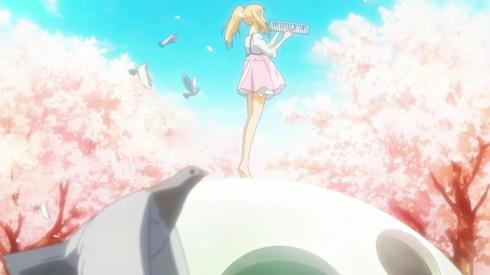
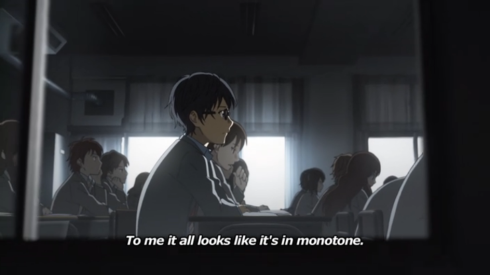
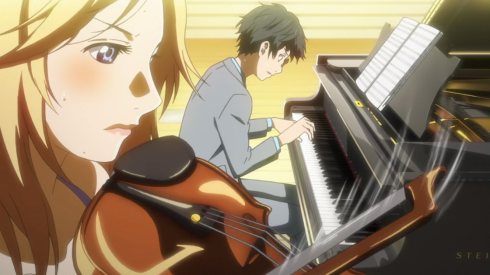
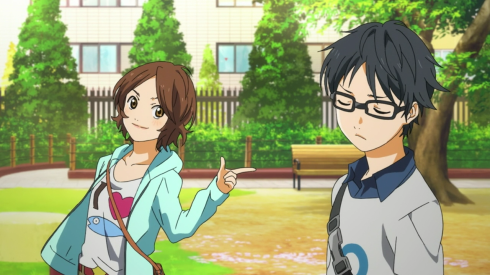
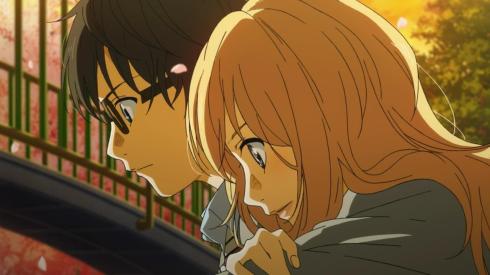
3 comments
Comments feed for this article
January 19, 2015 at 4:56 pm
crakthesky
Quick question before I read this post — spoilers? Read the first two paragraphs and this anime looks interesting and I’ll probably watch it at some point, but I’m hesitant to read further for fear of spoiling it.
January 19, 2015 at 6:32 pm
Seasons
I don’t think there’s anything that technically counts as a spoiler. I actually left out a lot of information about the plot although I sort of go into some of the discussion that’s surrounding the series (to an extent). A lot of this entry is psychobabble that’s only vaguely related to the series, actually.
January 19, 2015 at 7:03 pm
crakthesky
Thanks. Good stuff. I’m going to look into this series sooner or later. Sounds…interesting, and I hadn’t heard about it until this post.